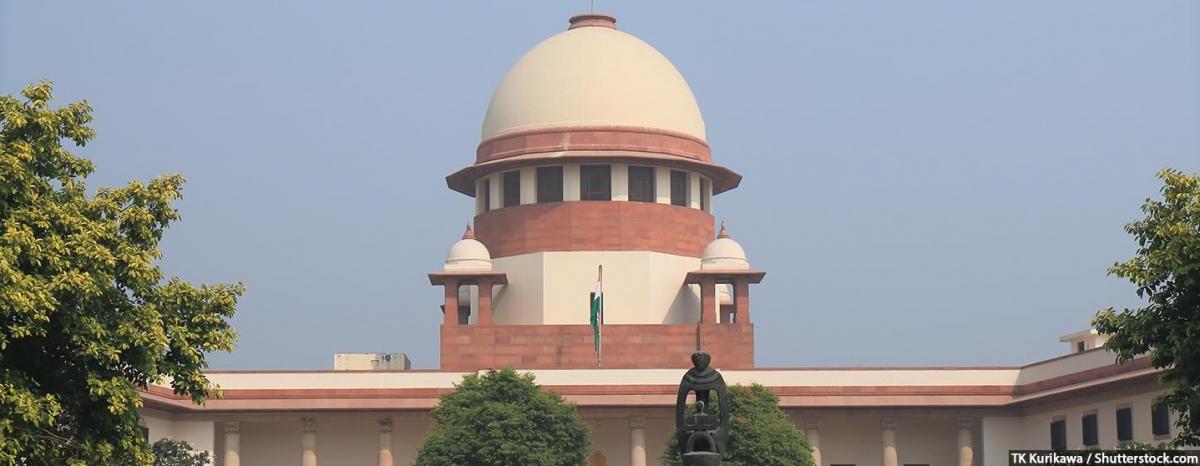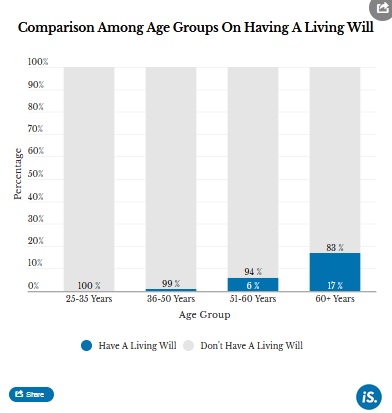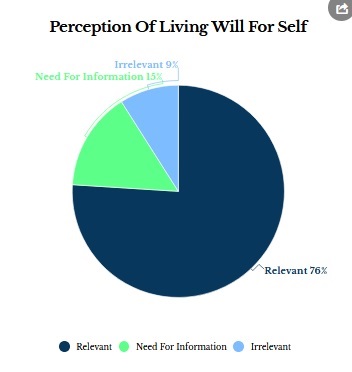Delhi: On March 9, 2018, a Supreme Court of India judgment declared “the right to a dignified life upto the point of death including a dignified procedure of death” to be a fundamental right enshrined under Article 21 of the Constitution.

By recognising that “an adult human being having mental capacity to take an informed decision has right to refuse medical treatment including withdrawal from life-saving devices”, the court enabled Indians to create an advance medical directive, or a living will, containing a person’s wishes regarding their end-of-life medical treatment should they lose their capacity to take decisions or convey their wishes.
A year after the judgement, a survey of more than 2,400 urban Indian respondents has found that while 88% of respondents wanted to decide their line of medical treatment during the last days of their life, only 27% were aware of the concept of a living will and only 6% of these had actually created a living will.
The Living Wiell Survey was conducted by healthcare service provider HealthCare at HOME (HCAH) across seven cities–Delhi, Mumbai, Kolkata, Hyderabad, Bengaluru, Chandigarh and Jaipur–with a sample size of 350 to 400 per region. There were an equal number of male and female respondents, who had been hospitalised for more than a day in the past year.
About 85% of the respondents said they wished to cause the least mental and financial trouble to their family during their last days, the survey found. Yet, 74% of respondents had never given any serious thought to dying and had not secured their family financially in case of their death, while 26% of respondents had.
Of the four age cohorts that the respondents were equally divided–25-35 years, 36-50 years, 51-60 years and 60+ years–senior citizens (60+) had the highest percentage (94%) of people wishing to cause the least trouble to their family members during their last days. Yet, only 80% of people in this age group–the least amongst all age groups–wanted to decide their treatment line during the last days of their life. In the age group of 25-35 years, 97% of respondents wanted independence of choice of treatment line, the highest among all age groups.
In the 25-35 years age group, 36% of respondents were aware of the concept of a living will, with this age group showing the maximum awareness. Only 21% people in the age group of 51-60 years knew about living wills, making this group the least aware.
Among respondents who were aware of living wills, 17% of those aged 60+ had a living will, while less than 1% in the age group of 36-50 years and none in the age group 25-35 years had one.

Source: The Living Wiell Survey, 2019
The survey was guided by the End of Life Care in India Task Force (ELICIT), whose members include the Indian Association of Palliative Care, the Indian Society of Critical Care Medicine and the Indian Academy of Neurology.
One of the objectives of the survey was also to make the people aware about the concept of a living will, according to HCAH.
Post understanding, 76% found the concept highly relevant for themselves, 15% required more information to make an informed decision about drafting a living will and 9% found a living will irrelevant to them and immoral. The latter stated its misuse and inability to decide the course of their last moments themselves, as reasons for not wishing to draft a living will.

Source: The Living Wiell Survey, 2019
Of the 76% people who found a living will relevant to them, 91% said they wished to discontinue any life support system in case they were declared terminally ill on artificial life support with no or marginal hope of recovery.
“The survey clearly shows that with more awareness around living wills, many more Indians would be able to take such informed decisions,” said RK Mani, head of ELICIT, in an email statement.
(Sharma is an intern with IndiaSpend.)
Courtesy: India Spend